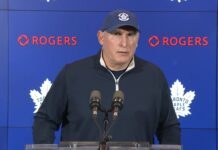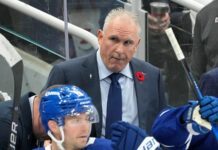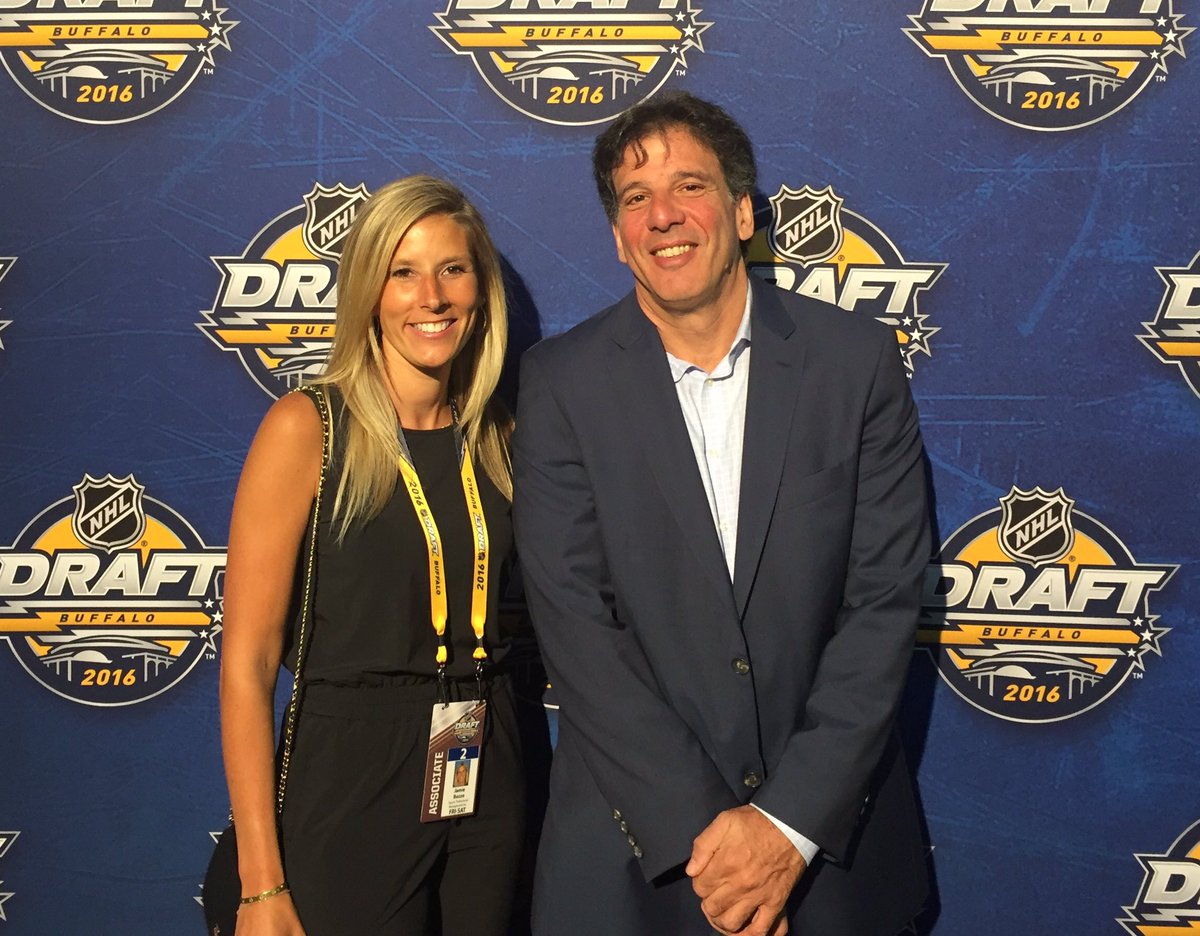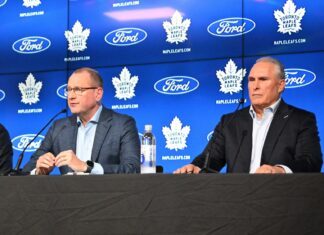William Nylander’s agent Lewis Gross joined Leafs Lunch on TSN1050 on Monday, discussing the protracted contract negotiation process between Nylander and the Leafs in reaching Saturday’s final contract.
Can you take us through the process of when conversations with Kyle Dubas started to when you ended up getting this deal done at 4:52? When did real conversations actually start with Dubas — when he became GM in May?
Gross: We met at the draft, was our first meeting together. That was the initial conversation we had, and then we really continued to talk throughout the summer. There was some face to face. He came to my office. We met outside the office. I came to Toronto. There were ongoing meetings and ongoing discussions throughout the entire summer.
The culmination of it all took place on Saturday, where we spoke Saturday morning and we spoke again right around lunch time and then again about 3:00 p.m. or so, and then at about 4:20 or so or 4:30, Willy and I made a call to Kyle together and spoke some more. We were able to reach an agreement.
When did you really feel that this was going to get done? If there is one thing you guys did so famously well, and even on the Leafs side, is that it was just so tight-lipped. We really didn’t know if it was going anywhere, if it wasn’t going anywhere. When did you really feel like this is going to happen?
Gross: I only really felt that way after we reached an agreement. I feel like there was so much discussion and different ideas and different terms, but there was never a time where I said, “Geez, I think we are really close here.” Once we made the deal, it would’ve been nice to sit back and breathe, but then we got concerned to get it in in time by the five o’clock deadline. Everything just became a whirlwind after we actually reached an agreement.
On the flipside, then, was there every any moments of doubt where you had to start coming up with a contingency plan?
Gross: I think we had a contingency plan for the last month or so in terms of — if this doesn’t work out, what are our options? What are we prepared to do? Where are we prepared to play? We looked at that, but we felt that, had we really done anything concrete, it might have come out and we didn’t want it to appear that our first hope wasn’t to sign with the Leafs. Had we made a deal with some team overseas, we just thought it could actually hurt our ability to make a deal and not help it. There were discussions, but we really were very tight-lipped about that as well.
Speaking to other agents around the league yesterday, one of the comments that came back was, “I wish all of my clients had Willy’s balls,” to use a crude term. Can you describe the way William handled this long and arduous negotiation?
Gross: The way that Willy appears on the ice and off the ice is the way he handled this negotiation. He was as calm and cool as anybody could ask for. He was always in complete control. I don’t think a day went by where we didn’t speak once or twice a day. There was never, ever any concern on his side. My personality kind of echos that. I think we both stayed calm through the process.
I think Willy said it pretty clearly. I think the only time I felt a little nervous was at about ten minutes to five — that he was going to be way too cool getting the contract back. I said, “Willy, get that thing signed and get it back right away.”
He was incredible. I can’t say enough about him. I mean, there has been so many players I have represented over the years and for a player his age to handle this the way he did was just incredible. Absolutely incredible.
You’ve been a part of a lot of different CBAs. What we are seeing now in the league is a lot of younger players really being the face of the league and the stars of the league. Do we need to make a change to the CBA with respect to how these top-end players coming out of entry-level can have some more rights? The older players are getting phased out of the league because the younger players are so good. Is this something that we’ve got to look at from an industry point of view?
Gross: The more rights a player has, the better it is. Without our rights, then maybe certain situations could be avoided where it comes right down to the wire. The other side of this is that the league doesn’t have a Willy Nylander playing and I don’t think that is a good thing for anybody. I think if somehow it can be addressed, it would be helpful, just to avoid that type of situation in the future.
The climate has changed.
Gross: Right. I don’t know if people realize just how difficult this was for Willy. To say that you might not play… if you’re lucky and have a ten-year career, this is 10% of that career, losing a year. That is not something that anyone would recommend. To really believe in what we were hoping to receive and believe in the way we felt the contract should be structured, it took a lot — a lot — of self-confidence on his part to believe in that.
I think his dad Michael was instrumental in this — not in a negative way, as he was perceived, at all, but in a very positive way and very supportive way. He’s gone through it and realized how important this negotiation really was to his future and to his chance to maximize his earnings and also play in an organization like Toronto. He only wanted to play in Toronto. It was his goal all along. He loves being a Leaf. He really, truly does.
Could you tell us, A) Why not taking the bridge deal was so important and if that was even on the table, and B) When talking percentages, how do you work that out for the comparisons of what you believe we’re worth?
Gross: In any contract, there is the macro and the micro. The macro is the entire NHL. You kind of use the macro more in arbitration than you do in a negotiation for an RFA like this. A big part of our focus was on the Leafs. Where does Willy fit in on the Leafs? Where will Willy fit in moving forward on the Leafs? We really tried to make that a focus of this negotiation. There are a lot of good contracts out there and they definitely came into play, but moving forward, where is he going to be within this team? This is really where he is employed. That seemed to be the focus on our side. That is what we really tried to accomplish.
In terms of the bridge deal, we just didn’t feel it was the right deal for Willy. If we go through three years on a bridge deal, then there is two years to UFA and we could be looking at two arbitration cases. I don’t think that held a lot of interest to Willy or to myself. I think on the shorter deal — the two-year bridge deal — he only has about a half a season now to prove his worth. Did that really make sense? As the clock ticked on, the bridge deal had less and less appeal to us.
I think he just felt like this was the right term. He would’ve obviously liked an even longer term, but in terms of trying to reach an agreement, this term seemed to make the most sense.
When everything is so tight-lipped, everyone starts to speculate and wonder what is going on. How much in control was William Nylander was this? How much was this idea and him sticking to his principles? Obviously, you always rely on a parent for advice and information, but how much of this was Willy leading the charge?
Gross: It really was Willy leading the charge. I don’t think anyone could do this if someone else was driving the bus. If someone is telling you to stay home, how many sleepless nights are you going to have and you are hoping this person is giving you the right advice? This has to come from yourself. This has to be an internal decision. This was not Michael driving the bus. This was not me driving the bus. This was Willy.
He is just a very confident young man. He really believed in this. From our first meeting, as we started to go through all the contract information, there was no question he… First of all, he is incredibly intelligent. He really was able to grasp a lot of the concepts and a lot of the things we’re doing. Especially with a mid-season signing, with the cap differential, net dollars become very important. He was very much a part of understanding that. He grasped the concepts. He knew exactly what was happening around him. This was nobody else but Willy.
We’re giving the best advice we can. I’ll tell you, his confidence and his intelligence were really just outstanding.
Are you aware of all the different perceptions of this negotiation going on from the outside?
Gross: We have people at the office who are monitoring social media. People are going to write and people are going to say what they want. We can’t control that. The truth of the matter is that this was not about greed. This was nothing about that. We just wanted to try to reach a fair deal.
Kyle did an incredible job, as did Brandon Pridham. This was a difficult contract; a very difficult contract. They have salary cap issues and nobody knows what that cap is going to be moving forward. We tried to understand that from their side. I think they did a great job trying to understand it from our side. It was just reaching a point where everybody could be satisfied. This was a difficult contract. It really and truly was.

![Craig Berube on the Leafs’ lack of “pride” during their losing streak: “[The players] have to bring the heart and competitiveness that’s needed… That’s on them” Craig Berube, Toronto Maple Leafs head coach](https://mapleleafshotstove.com/wp-content/uploads/2025/12/berube-pg-dec-leafs-218x150.jpg)













![John Gruden after the Leafs prospects’ 4-1 win over Montreal: “[Vyacheslav Peksa] looked really comfortable in the net… We wouldn’t have won without him” John Gruden, head coach of the Toronto Marlies](https://mapleleafshotstove.com/wp-content/uploads/2025/09/gruden-post-game-sep-14-218x150.jpg)












![Craig Berube on the Leafs’ lack of “pride” during their losing streak: “[The players] have to bring the heart and competitiveness that’s needed… That’s on them” Craig Berube, Toronto Maple Leafs head coach](https://mapleleafshotstove.com/wp-content/uploads/2025/12/berube-pg-dec-leafs-100x70.jpg)





